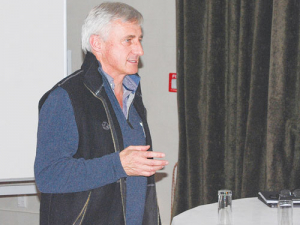The retiring Federated Farmers president, Dr William Rolleston, is warning farmers that they will soon be “chasing the tail” of synthetic food producers because of their products’ lesser environmental footprint.
The emergence of synthetic ‘milks’ and ‘meat’ is something farmers “really need to take cognisance of,” he says.
Rolleston, who stands down this month, reviewed his three-year term in a closing address to the recent two-day conference of Feds’ South Island high country group at Hanmer Springs.
He recalled having recently been to a conference where he picked up a jug with ‘soy milk’ written on it.
“I pulled out my pen and crossed out the word ‘milk’ because it’s not actually milk. Milk comes from a mammary gland, not a soya bean,” he said.
“Maybe as we make these free-trade agreements, talking about geographic indicators, we can actually push for the words ‘milk’ and ‘meat’ to truly mean milk and meat, not some substitute, so people know they are getting the real deal.”
However, Rolleston warned that the driver towards synthetics is their environmental footprint – a strong selling point.
“These foods have very low carbon and water usage,” he explained. “The challenge for us is not in our wanting to hold the status quo in terms of our environmental footprint, but that we must try to reduce… close that gap, as much as we possibly can, to stay relevant and keep our products on the shelf.”
Rolleston says the environment was one of the main areas he wanted to look at when he took on the Feds president role.
He says what is now going on in dairy farming is causing “a whole lot of rules” to be filtered up into the high country and this will challenge high country farmers to deal with pressures to adopt inappropriate rules.
Rolleston adds it’s no longer acceptable or reasonable to be saying climate change doesn’t exist; rather, he believes the issue is about productivity.
“If we can improve our productivity and reduce our carbon intensity – i.e. the amount of carbon dioxide or equivalent produced per kilogram of product – that’s better for us, and it’s something we can take to the market and say ‘we’re making a difference’.”
Rolleston also warns that as the September general election nears there will be a “big push” to vilify farmers’ environmental record. However, he believes the pendulum is starting to swing in the other direction: people are starting to tell him that the anti-farming sentiment is overstepping the mark.
“I see a bit of a sea-change happening in the media. It gives us the opportunity to drive that message further forward and keep telling the public all the things we are doing, right down to catchment level.”
Another area Rolleston counts as a success is health and safety where, by taking an evidence-based approach, Federated Farmers has managed to persuade WorkSafe to a more reasonable view on what had been “pretty traumatic” new legislation.
He said guidelines now allow farmers to take passengers on quads when it is sensible and the risks are properly assessed, rather than endure a blanket ban.
“My view is if you don’t with engage farmers they’re going to ignore you. Farmers hate being told what to do, but if you give them a problem they want to solve it. You see that in the environmental space and also in health and safety.”
Rolleston believes science and innovation are still crucial for agriculture. He says biological sciences took decades to come to fruition and were expensive, but New Zealand is very good at biology.
“We have real strength in that area and while we need to diversify the economy because that gives the economy resilience and strength, we don’t want to do that at the expense of what we are good at and have a real comparative advantage in -- agriculture.
“So we’re very keen that when the Government is prioritising funding they don’t undermine the capability of our scientists around the country.”
Rolleston says Beef + Lamb NZ takes about $31 million in levies and spends about $5m on R&D.
“It should be $25m in my view. That $5m represents something like 0.02% of the total revenue at the farm gates and it should be about 2% -- that’s the OECD average. If we want to get ahead in these areas we actually have to be spending more money – not less -- on R&D.”
However, he admits the BLNZ levy is hard to maintain in the face of various financial pressures.
“There are tensions, but I support the levy because it enables us to group our money together and do something strategic in R&D.”
Rolleston says during his time at the helm of Feds he has steered the group to make decisions based on evidence-based science, being the voice of reason rather than “just shouting at the opposition”.
That was sometimes frustrating and came at the expense of short term visibility, but it gave the group credibility and made it “so much more effective” in the long term.











